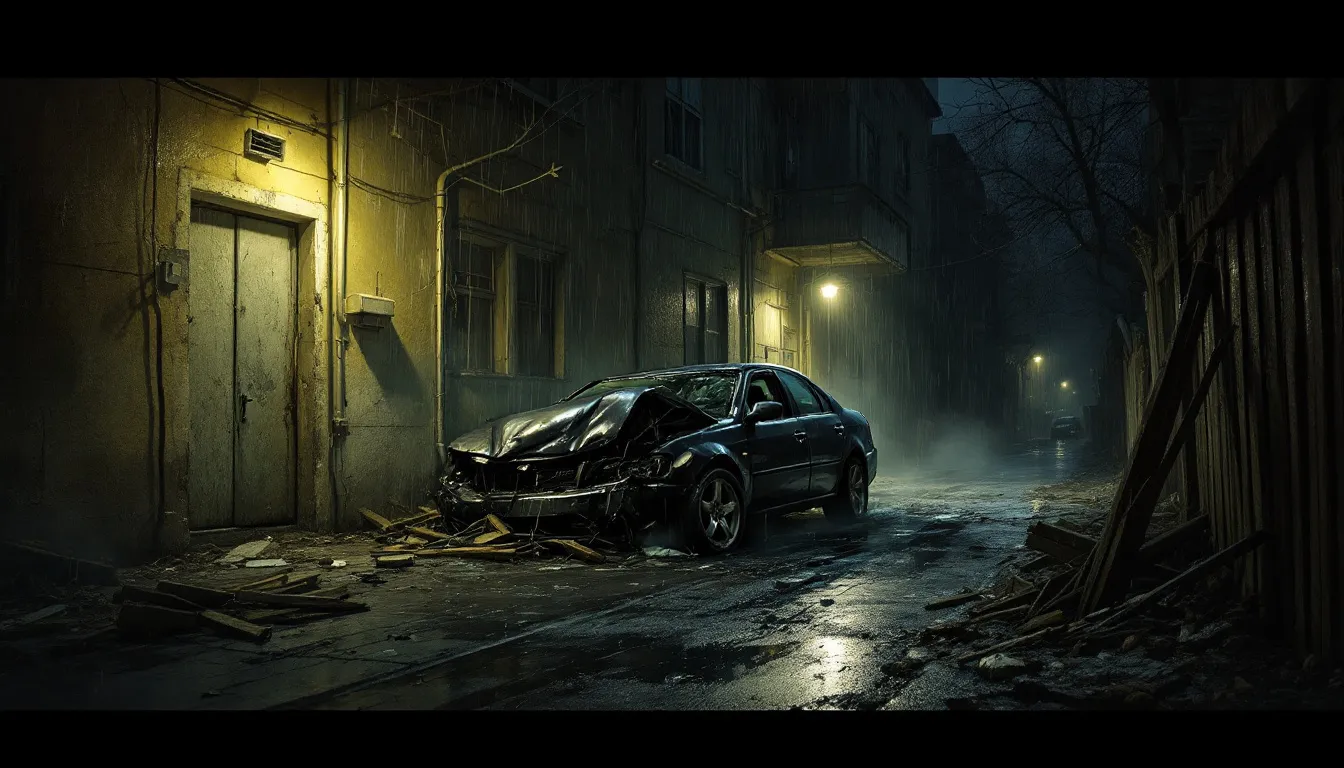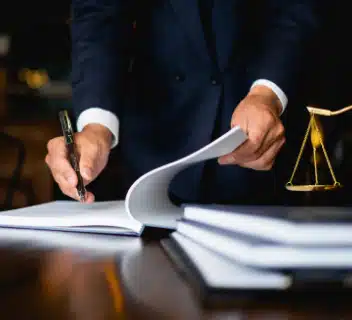Steps to Take When a Vehicle Damages Your Property
A vehicle damages your property – now what? This article explains the immediate actions you should take, how to handle insurance claims, and what to do if disputes arise. Learn about property damage liability, the role of the at-fault driver’s insurance, and when to seek legal help.
Key Takeaways
- After a vehicle damages your property, prioritize safety and document the incident thoroughly, including photos, witness information, and police reports.
- Property damage liability coverage is essential for compensating another person’s property damage, but does not cover your own vehicle; checking your insurance policy and understanding the claims process with your own insurer is crucial.
- Understanding the statute of limitations and seeking legal assistance are vital steps to ensure the timely filing of claims and maximizing compensation for damages.
Immediate Actions After a Vehicle Damages Your Property

Following a motor vehicle accident resulting in property damage, ensure the safety of all parties by moving to a safe location and minimizing Hazards. Then promptly notify law enforcement to receive assistance and secure an official record of the auto accident and car crash.
It’s crucial to meticulously document everything. Take detailed photographs that clearly show all vehicles involved, the environment where the accident occurred, and any tangible evidence at the scene. If the accident involves a parked car, make sure to document the position of the vehicle and any damages thoroughly. These photos will be critical when you submit your property damage claim. Also, gather contact details from every driver present as well as any witnesses. Their testimony may validate your account of events, thereby reinforcing your claim.
Seek out security cameras in proximity that might have recorded what transpired during your incident. Securing this video material can significantly aid in demonstrating how events unfolded on-site. Exercise discretion when communicating with others—be mindful not to assign blame or make comments that could imply responsibility for what happened.
Taking these measures constitutes vital preparation for presenting a robust property damage claim by amassing ample evidence required to substantiate your argument regarding fault after an automobile collision has impacted your vehicle or other properties involved.
Documenting Vehicle Damages and Gathering Evidence
Documenting vehicle damages and gathering evidence is a crucial step in the claims process. After a motor vehicle accident, it’s essential to take photos and videos of the damage to your vehicle and any other property that was damaged. This visual evidence can help support your property damage claim and ensure that you receive a fair settlement.
In addition to visual evidence, it’s also important to gather witness statements and police reports. Witness statements can provide valuable information about the accident, including the events leading up to the crash and the actions of the at-fault driver. Police reports can also provide important details about the accident, including the location, time, and cause of the crash.
When documenting vehicle damages, be sure to include the following information:
- Photos and videos of the damage to your vehicle and any other property that was damaged
- Witness statements, including contact information and a detailed account of what they saw
- Police reports, including the incident number and a copy of the report
- Repair estimates and invoices from a reputable repair shop
- Any other relevant documentation, such as medical records or lost wage statements
By gathering and documenting this evidence, you can build a strong property damage claim and increase your chances of receiving a fair settlement from the insurance company.
Understanding Property Damage Liability Coverage
Property damage liability coverage is a vital component of car insurance that covers the cost of repairing another person’s property, such as their vehicle and any personal property inside it, if you are at fault in an accident. Each state mandates this type of coverage with varying minimum requirements for how much one must carry.
Should your own vehicle sustain damage in a motor vehicle accident, it’s important to note that property damage liability will not cover its repairs. Instead, collision coverage would be necessary. It’s essential to review your insurance policy to determine whether it includes provisions for damages you may cause and inform your insurer immediately after an accident occurs so you adhere to any deadlines regarding claims submissions.
Bear in mind that should the expense of repairs exceed the limits of your coverage, you’ll need to pay the difference out-of-pocket. Opting for higher than required limits on your property damage liability can afford additional peace of mind but might result in elevated premium costs. A clear understanding of this aspect within car insurance policies ensures better preparedness when dealing with possible expenses arising from vehicular incidents.
Common Types of Motor Vehicle Accidents that Result in Property Damage
Motor vehicle accidents can result in a wide range of property damage, from minor scratches and dents to major repairs and even total losses. Some common types of motor vehicle accidents that can result in property damage include:
- Rear-end collisions: These accidents occur when one vehicle strikes another from behind, often causing damage to the rear bumper and trunk of the vehicle.
- Side-swipe collisions: These accidents occur when one vehicle strikes another from the side, often causing damage to the doors and side panels of the vehicle.
- Head-on collisions: These accidents occur when two vehicles strike each other head-on, often causing significant damage to the front of both vehicles.
- T-bone collisions: These accidents occur when one vehicle strikes another at a 90-degree angle, often causing damage to the side of one vehicle and the front of the other.
- Single-vehicle accidents: These accidents occur when a vehicle strikes an object, such as a tree or a pole, or rolls over, often causing damage to the vehicle.
Regardless of the type of accident, it’s essential to document the damage and gather evidence to support your property damage claim.
Filing a Police Report and Insurance Claim
After experiencing a car accident that leads to property damage, it’s critical to file a police report. This official document will outline the incident’s specifics like the date, time, location, involved individuals, any witnesses’ accounts as well as observations by officers at the scene. An objective record such as this can serve as convincing evidence and significantly bolster your property damage claim.
To acquire your police report, get in touch with the law enforcement agency present at the accident site. You may need to request it either online or through an in-person visit depending on their procedures. Once you’ve received the report, promptly notify your insurance company about it—typically handling claims via one’s own car insurance is advisable when contending with at-fault driver’s insurance policies.
Prior to making contact:
It is imperative that documentation supports your claim for damages sustained during a vehicular mishap—a comprehensive package of information enhances its credibility considerably before submitting anything.
- Police reports
- Visual records (videos/photos) showing various angles and extents of property damage
- Statements from any eyewitnesses
Such meticulously compiled details fortify not just your position, but also streamline the processing of said claims when dealing with insurers, ensuring swift resolution where fault might be disputed amongst those involved or aspects concerning coverage under relevant laws must be considered for due recompense according thereto.
Determining Fault and Liability
Fault and liability in a property damage case involve more than just identifying the at-fault driver. In some cases, it may be more efficient to file a claim with your own insurer to expedite the process and ensure timely compensation. Liability can extend to vehicle owners and employers if the accident occurred during the course of employment. Proving negligence requires demonstrating a breach of duty that caused the damages.
Sometimes, suing for property damage may be necessary, including loss of property, repair costs, and other relevant expenses. Comparative negligence laws may apply, meaning fault can be shared between parties, impacting the compensation amount. Suspending multiple parties involved in a property damage case can maximize your recovery options.
Understanding who is responsible and to what extent is crucial for ensuring you receive the compensation you deserve. Consulting a legal professional can help navigate these complexities and determine the best course of action for your situation.
Calculating the Total Dollar Value of Property Damage

There are multiple steps to follow to ascertain the complete worth of property damage. Engaging a professional appraiser is one approach to take. Their role would be to assess the pre-accident market value of your asset, offering an accurate appraisal of the extent of harm incurred. Collating records of losses and scrutinizing the damaged site contribute towards establishing the aggregate cost entailed by such damages.
The pursuit of recompense for wrecked personal property typically hinges on their fair market valuation both prior to and subsequent to incurring damage. Should properties become lost or totally demolished, reimbursement reflects their immediate pre-loss fair market price. Proprietors can press claims reflecting special values tied to items holding unique economic significance exclusive from conventional marketplace valuations.
In instances where loss of use is applicable, calculations might derive from estimating reasonable leasing expenses applicable for comparable assets while repairs are underway. Typical forms encompassing injury within a property damage claim span charges associated with rectifications as well as resultant ongoing harm documentation and thorough evaluation pertaining to sustained destruction that play pivotal roles in securing just compensation proportionate with your experienced losses.
Navigating Disputes with Insurance Companies
Engaging with an insurance company can often be uncomplicated, yet it has the potential to get complicated when a claim is contested. Obtaining a police report can considerably bolster your claim and expedite its resolution. Should you find yourself in contention with your insurer, make sure to request that they conduct an internal appeal to reassess their initial judgment, especially when dealing with at-fault driver’s insurance.
In instances where the internal appeal fails to produce acceptable results, consider requesting an external evaluation from a neutral third party. It’s important to lodge a complaint with the regulatory body for insurance in your state if there’s reason to suspect that the insurer is not acting justly.
Persistence and comprehensive knowledge of your insurance policy are essential when navigating through these disputes. Being aware of both your entitlements and appropriate actions empowers you with confidence as you advocate for equitable treatment regarding your claim.
What if the Insurance Company Declares Your Property a Total Loss?
If the insurance company declares your property a total loss, it means that the cost of repairs exceeds the value of the vehicle. In this case, the insurance company will typically offer you a settlement based on the actual cash value (ACV) of the vehicle.
The ACV is the vehicle’s market value at the time of the accident, minus any depreciation. The insurance company will use a variety of factors to determine the ACV, including the vehicle’s make, model, year, and condition, as well as its mileage and any custom features or upgrades.
If you disagree with the insurance company’s assessment of your vehicle’s value, you may be able to negotiate a higher settlement. It’s essential to have a clear understanding of your vehicle’s value and to gather evidence to support your claim.
In addition to the ACV, you may also be entitled to additional compensation, such as:
- Sales tax: You may be entitled to reimbursement for sales tax on the purchase of a new vehicle.
- Registration fees: You may be entitled to reimbursement for registration fees on the purchase of a new vehicle.
- Rental car expenses: You may be entitled to reimbursement for rental car expenses while your vehicle is being repaired or replaced.
It’s essential to review your insurance policy and understand your rights and options if your vehicle is declared a total loss.
Importance of the Statute of Limitations
It’s essential to be mindful of the statute of limitations when filing claims for property damage, as it plays a pivotal role. Different states set varying deadlines for these claims depending on the type and circumstances surrounding the damage. Overlooking to file within this period can forfeit your opportunity to claim damages.
Once the statute of limitations has elapsed, any legal action taken may be instantly rejected, thereby restricting options available to claimants. There are instances where extensions or deviations from these time constraints might apply. An example is if those injured were incapable at that time. The rationale behind statutes of limitations is to shield defendants from lawsuits after considerable periods have passed, which could result in evidence deteriorating in quality.
To avoid forfeiting your right to seek financial restitution for losses incurred, one must act promptly and with knowledge regarding applicable deadlines specific to their situation. Ensure you adhere strictly to these limits so as not to miss out on potential compensation.
Legal Assistance for Property Damage Claims

Enlisting the aid of a personal injury attorney can greatly enhance your property damage claim efforts. Such lawyers are adept at collecting evidence, including photographs and professional evaluations, to bolster your case. Their expertise in negotiating with insurance companies often leads to more substantial settlement offers. Contact 1-800-THE-LAW2 today for a free consultation with a personal injury attorney in our professional network.
If you encounter resistance from an insurer—such as a rejection or delay of your property damage claim, or if the proposed settlement seems insufficient—it’s wise to consult with an attorney. Many legal practices offer free initial consultations so that you can explore your options without any financial pressure. Engaging a lawyer early on is beneficial for effectively navigating through the legal procedures and securing just compensation for your losses.
An experienced lawyer is well-equipped to manage disputes related to claims efficiently, ensuring that you receive appropriate compensation for damages incurred. Acquiring legal support can be crucial in influencing the resolution of your property damage claim and providing essential assistance as you recover from these incidents.
Summary
In essence, addressing property damage resulting from a vehicle accident necessitates immediate and knowledgeable actions. It is important to prioritize safety, record the incident thoroughly, comprehend your coverage for property damage liability, and proceed with filing an insurance claim, whether through your own insurer or the at-fault driver’s insurance. Accurate determination of who is at fault and careful assessment of the total value of damages are key factors in ensuring you obtain just compensation.
Understanding how to maneuver through disputes with insurers as well as being aware of time restrictions imposed by statutes can be critical in safeguarding your legal rights. Enlisting legal help offers significant advantages under these circumstances by aiding you in obtaining a fair settlement agreement. By adhering to these guidelines, one can confidently manage the consequences when their property has been damaged by a vehicle and secure rightful compensation.
Frequently Asked Questions
Immediately ensure everyone’s safety, document the damage with photos, collect contact information from all involved parties and witnesses, and refrain from admitting fault. If the accident involves a parked car, make sure to document the position of the vehicle and any damages thoroughly.
Taking these steps will help protect your interests moving forward.
Property damage liability coverage includes repairs to another person’s property, such as vehicles and personal property, that you damage in an accident. This coverage ensures that you are financially responsible for the damage caused to others.
Contact the law enforcement agency that responded to your car accident to obtain a police report. This document will include critical information including the date, time, location of the accident, and witness statements which are necessary for filing with the appropriate authorities under law.
Fault in property damage cases is determined by establishing negligence, which requires proving a breach of duty that directly caused the damages.
This assessment can encompass various parties, including vehicle owners and employers.
The statute of limitations is essential in property damage claims because it sets a deadline for filing, and failing to meet this deadline can forfeit your right to seek damages.
Therefore, timely action is critical.




